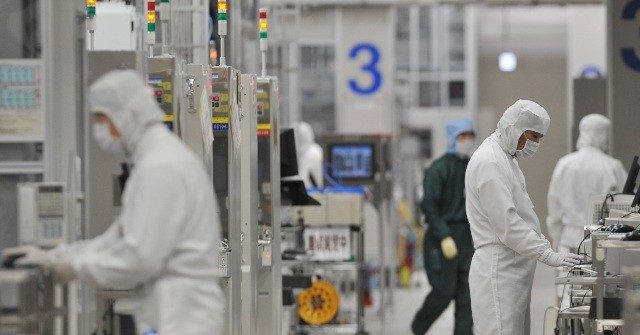The Cyberspace Administration of China (CAC), the chief regulatory agency for Internet technology in the Communist tyranny, ruled on Sunday that some products from U.S. chipmaker Micron Technology Inc. failed a “security review.”
CAC did not specify which products, what the security review entailed, or how Micron’s chips failed.
China’s cyberspace regulator said that products made by US memory chipmaker Micron Technology had failed its network security review and it would bar operators of key infrastructure from buying from the company https://t.co/wby2z94CII pic.twitter.com/PSqc0KxkQz
— Reuters (@Reuters) May 22, 2023
“The review found that Micron’s products have serious network security risks, which pose significant security risks to China’s critical information infrastructure supply chain, affecting China’s national security,” CAC said.
China’s state-run Global Times noted it was the “first public announcement of a supplier failing to pass official review” since CAC began conducting security audits.
“From the perspective of public safety and cybersecurity, we conducted inspections and found that the products of Micron had certain hidden dangers and did not conform to national regulations. Therefore, it is normal to impose relevant restrictions on Micron’s products,” Beijing Academy of Social Sciences research fellow Wang Peng told the Global Times.
China Sunday announces US #semiconductor giant #Micron Technology didn’t pass a #cybersecurity review, which experts said is an individual case that does not mean any change to #opening-up policy. https://t.co/WzjZpb0dzO
— Global Times (@globaltimesnews) May 21, 2023
International analysts puzzled over China’s abrupt and seemingly petulant ruling against Micron, noting that it would have only a limited impact on the U.S. company’s bottom line because most of Micron’s sales in China are to phone and computer manufacturing firms, not critical infrastructure suppliers.
Micron itself predicted a revenue loss in the “low-single to high-single digit percentage.” The company’s stock slipped six percent in premarket trading but recovered 2.6 percent on Monday morning. Micron gets over ten percent of its total revenue from sales in China, so the impression left by CAC’s action is of a warning shot fired across the bow of Micron and other American companies.
“Analysts said Micron presented an obvious first target for Beijing as its tech would be more easily replaced with competitors’ chips from South Korean rivals Samsung and SK Hynix. Last month the White House asked South Korea to urge its chipmakers not to fill any market gap in China if the sale of Micron products was restricted,” the Financial Times reported on Sunday.
“This could be really bad for Micron. It depends how broad China’s definition of critical information infrastructure is, but this could include the financial sector, transportation, energy and data centers,” ventured Albright Stonebridge tech expert Paul Triolo.
China said US chipmaker Micron Technology’s products posed ‘serious network security risks’ as it banned operators of key infrastructure from buying them https://t.co/F4QWzxg9uX
— Financial Times (@FinancialTimes) May 22, 2023
The Financial Times quoted a source that said Micron was given no warning of an impending ban and has received no communications from CAC since the regulator asked a few questions at the beginning of its security audit in March.
The U.S. Commerce Department denounced China’s action and linked it with “recent raids and targeting of other American firms” to create a business environment that is “inconsistent” with China’s claims that its markets are open and its regulatory framework.
“We firmly oppose restrictions that have no basis in fact,” the Commerce Department said.
The raids referred to by the Commerce Department included the Mintz Group, Bain & Company, and most recently Capvision Partners, a financial consulting firm raided by Chinese police on May 9. The sudden and poorly-explained raids seem to be an effort by the regime to block foreign companies from accessing Chinese economic data.
The Micron ban could be China’s revenge for U.S. export controls on chips that could be diverted to military applications. Hu Xijin, a Chinese Communist Party firebrand and former editor of the Global Times, certainly seemed to think so.
“Washington itself encourages U.S. companies to do things that endanger China’s national security, so it suspects that Chinese companies are doing the same. The whole world should be wary of the U.S.,” Hu tweeted when news of Micron failing the CAC security audit broke.
The CAC announcement could also be part of China’s outraged response to the weekend’s G7 meeting in Hiroshima, Japan.
The G7 resolved to diversify supply chains so it would become less reliant on China, a statement Beijing hysterically denounced as the beginning of a new Cold War. China actually summoned the Japanese ambassador on Sunday to complain about the “anti-China workshop” Japan hosted in Hiroshima.


